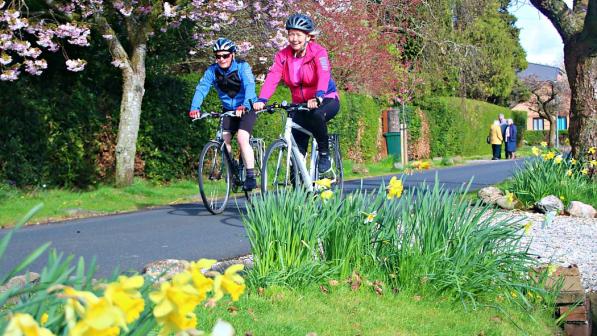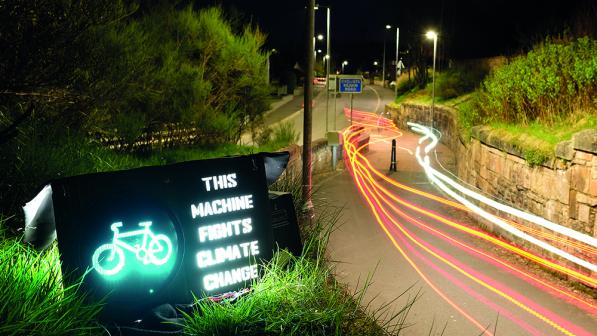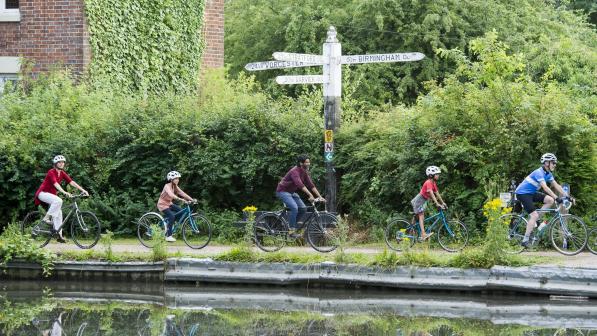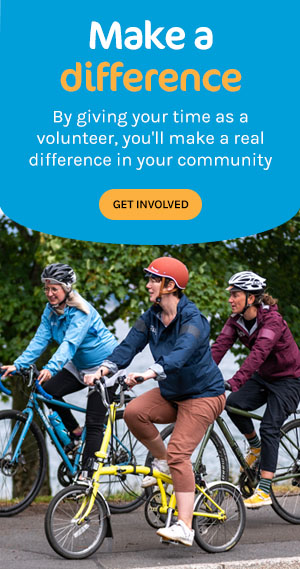Cycling UK volunteer Jill Borcherds kickstarts national union cycling campaign

Jill Borcherd's story illustrates how a piece of focused advocacy work has potential to draw in many more people to be active travel campaigners – and influence the travel habits of a generation.
Complete newbie
Jill, who works as a teacher, collaborated with colleagues in the Hertfordshire district of the National Education Union (NEU) to draft the proposal.
She says: “This is the first time I’ve ever tried something like this – I’m a complete newbie. It started as an exercise in our local union meeting; we were tasked with writing a sample proposal. I wanted to make it about something I am passionate about, so I chose cycling.
“A few of us worked on it, and it was reasonably straightforward. In due course, it was chosen to be one of the motions debated at the Annual Conference, which is hugely significant because any motion that gets passed at conference becomes NEU policy.”
Identifying the problem
Jill and her district colleagues identified the basic problem to be that the proportion of children who travel to school on foot or by cycle is decreasing. Although various factors contribute to this, not least the very patchy provision of safe cycling routes to and from schools, they realised that there is plenty more that many schools can do to improve access for cycles and encourage participation. The implications for student and staff health, carbon emissions reduction, and air quality in the vicinity of schools are significant.
Jill recognises that “although some schools do have an outright ban on students cycling, it’s more often the case that internal rules inadvertently create barriers to active travel. Action on climate change is a hot topic in schools, and leadership teams are very often open to change when they realise that there are practical things they can do; this might simply mean opening an extra gate at school-run time that gives their pupils direct access to a quieter route to and from their home.”
Giving schools food for thought
The conference took place in Bournemouth just prior to Easter. Although Jill did not attend herself, she briefed the delegates who proposed and seconded the motion. One part of the motion (reproduced on this page) instructed the union’s executive committee to ‘campaign against any [school] that discourages active travel to school – for example by… [insisting that] only dark coats may be worn to and from school.’
We're giving teachers and their schools food for thought
Jill Borcherds, Cycling UK Cycle Advocacy Network member
Jill says: “Our proposer remarked that this was not something that had even occurred to them before – that a uniform policy might unintentionally prevent pupils from cycling. We’re giving teachers and their schools food for thought.”
Knocking at an open door
It turns out that they were knocking at an open door, and after a short discussion the motion was carried by conference. It is now NEU policy to campaign for all education employers to sign up to a Cycle to Work scheme for their staff, to provide secure cycle and scooter parking and to promote active travel in schools and colleges.
In many cases, workers in the education sector are employed by the Local Authority (LA), which up to now may be used to only hearing from the same old voices when it comes to cycle campaigners, because the council will also be the local highways authority.
Huge potential to change
Jill’s advocacy work now means that these voices will be supplemented by a further respected body in the community: teachers and support staff themselves.
Jill is also keen to point out that teachers are increasingly employed by academies rather than local authorities, who are often private employers who won’t have heard from cycle campaigners before – few of them have yet to adopt a Cycle to Work Scheme for their teaching staff. They’ll now be starting to hear about this from their NEU-affiliated staff members, so there is huge potential for change.
Encouraging other teachers
Heartened by this result, Jill says: “I would encourage anyone else who is a union member to think about whether this is something that they could do for their profession. If you’re a teacher in the Teachers’ Union (NASUWT), or a member of UNISON, could you adapt this proposal accordingly and get it adopted nationally?”
Yes, you CAN too!
Cycling UK runs the Cycle Advocacy Network (CAN) specifically to support people to speak up for cycling in their community. There is a Campaign Handbook and a wealth of resources in the toolkit.
We organise ‘virtual gatherings’, such as talks, presentations and discussions on all sorts of issues relevant to local campaigners. These are all available to the general public, and if you take the option to connect with CAN, we’ll mail you with updates so that you stay in the loop.
There is also the option to join Jill and 250 others as a local representative for Cycling UK, which additionally gives you access to the CAN web discussion forum, the hive mind of local cycle campaigners across the UK.
If you’re inspired by Jill’s example, why not look for ways to influence change in your own profession, union or workplace? Make use of our resources, link up with CAN – and let us know how you get on.





